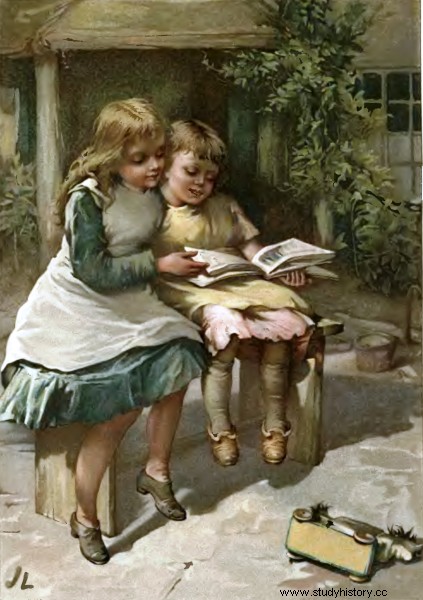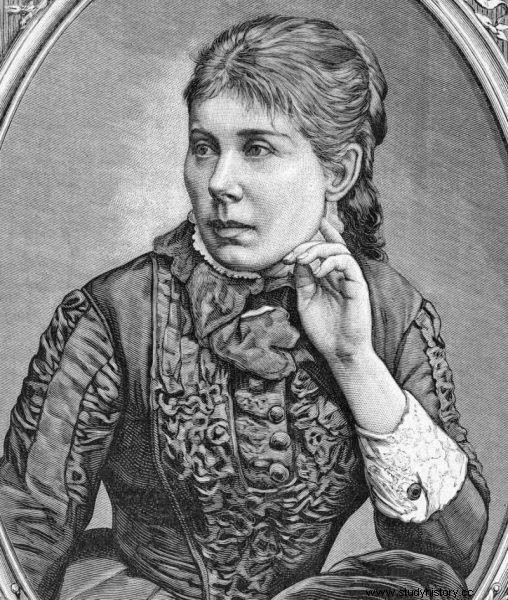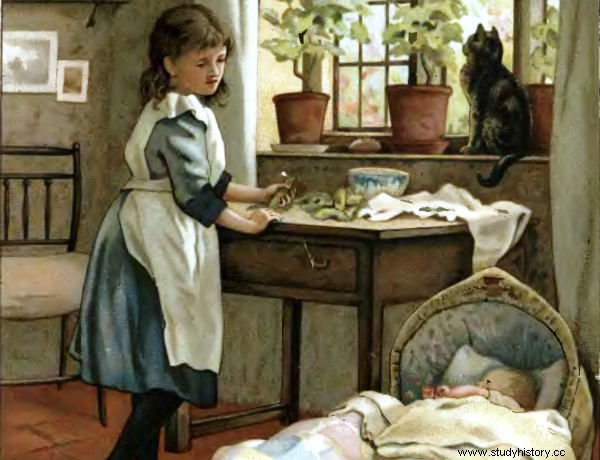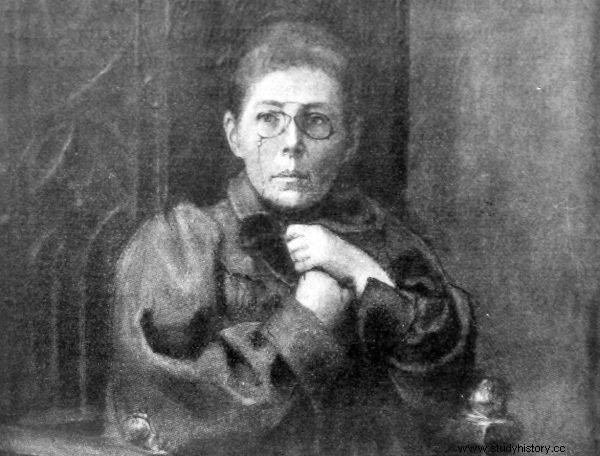Maria Konopnicka disowned her mentally ill daughter. She wished the girl had ... taken her own life. What happened to "degenerate" Helena?
Paradoxically, the least information has been preserved about the poet's middle daughter, the cause of worries and problems for the whole family. We do not have her photo or birth certificate, we do not have any letter written by her, the diary written by Helena has not survived , we do not even know the exact date of her birth . All the aforementioned documents concerning this poet's daughter have been irretrievably lost, not so much as a result of historical turmoil, but as a result of internal family "censorship" (...). No wonder, as they contained information that could seriously damage the flawless image of the "caring mother" so carefully constructed by the author of Mr. Balcer .
Have a nice bad start
In Maria Konopnicka's piece How the children in Bronów had fun with Rozalia we can find a very sensitive description of the still tiny Helenka:“And Helenka was sleeping in the meantime. Neither is it in her mind that the sun has already entered, that the swallows have brought the children breakfast (...). Helenka is all pink, on the forehead there is dew, so the baby is sleeping. Why is she not supposed to sleep or is it bad for her? It's only when the boys get started and she starts to wake up. She pulled out one hand, pulled out the other, both pink, greasy, both fisted together, then she opened her dark eyes and lies silently, as if nothing happened ”. These are probably the only warm words that Konopnicka wrote about her middle-aged daughter . Well, it's easy to love a baby when he's a cute little toddler, much harder when he grows up and causes trouble.

The least information has been preserved about the poet's middle daughter, the cause of worries and problems for the whole family (this image comes from Konopnicka's book "Happy Little World")
Helenka and her mother left for Warsaw in 1878, but after a few years the mother sent her daughter to Gusin, to her father or to his relatives. Why? Was it already causing trouble? In a letter to her uncle in February 1882, Maria justifies her decision as follows:“Helenka, but not with us; only when Zosia leaves the house will I be able to take her, because now I can hardly, hardly work days and nights, often feed, clothe and continue to teach this group ".
However, in the same year, Helena returned to Warsaw to prepare for the exams under the watchful eye of her mother. Unfortunately, it is not known what exams those were and whether the girl took admission to any school, and if so, with what success.
Illegitimate child
When in 1883 Konopnicka set off on a trip abroad, she left Stanisław, Tadeusz and just Helena at home, as evidenced by the mention in a letter to Ignacy Wasiłowski:"Helcia manages the house", but shortly after her mother decided to send her to her father . (...) At that time, the girl became pregnant and gave birth to an illegitimate child.
Unfortunately, we neither know the exact date of the baby's birth nor its gender. His grandmother, Maria Konopnicka, wrote about him "this child", treating him with indifference, as an unnecessary burden, who complicated not so much her daughter's life, but the whole family, tarnishing the poet's good name at the same time. The only trace on the basis of which it is possible to locate his appearance in the world is in Maria's letter to Laura, dated April 7, 1890, in which the poet informs her youngest daughter:"[...] the burden of new payments for the child fell on my neck Helium. and the obligation to continue to maintain it. Because who will take care of him? After that, it will be necessary to put him in the countryside, but for a few more years he will have to pay ".

The text is an excerpt from the book by Iwona Kienzler “Maria Konopnicka. A ravaged godless ”(Bellona, 2022).
The letter also shows that the child is not walking yet, from which it can be concluded that he was born in 1888, and Helena must have become pregnant a year earlier (...).
The antics of the "degenerate" daughter
Helena, staying with her father, probably also deprived of contact with her own child, must have missed both her mother and siblings. Unable to otherwise force Maria to visit her, came up with a cunning, perverse but cruel plan . She sent a telegram to Warsaw with the alarming content:" My father is dying, the horses are waiting in Sieradz. Konopnicki ”. Maria packed the most necessary things as quickly as possible and, together with Zosia and Janek, who were with her in Warsaw, set out on the way to, as she thought, say goodbye to Jarosław forever.
After the 24-hour journey, Maria, Jan and Zofia appeared in Góra, but they did not find their father in the bays, but… quietly eating breakfast with the local parish priest! To his surprised wife and children, he announced that he was not going to the other world, he felt great and had never been ill ... The whole hoax was the work of a longing Helena, who was looking forward to the arrival of her mother and siblings. Unfortunately, the only thing she gained was the deterioration of relations with Konopnicka, which were very bad anyway (...).

Konopnicka had no other choice and took her "degenerate" daughter to her place.
When Jarosław lost his leased property in Góra, Konopnicka had no choice but to take her "degenerate" daughter to her place. According to the information contained in the aforementioned letter from Pług, the girl began her education at Platerówna's salary in order to prepare for the teacher's exam. (...) Of course, the child, a clear proof of Miss Konopnicka's immorality, remained in the countryside.
Miss Helena's Madness
Helena initially followed her mother's plan and actually became a teacher, starting a series of much more serious problems. In January 1889, she lost her lucrative job as a result of ... theft. (...) This was just the beginning of Helena's antics, who started stealing, it was an evident kleptomania.
The mother concluded that her daughter "is struck by a severe form of hysteria bordering on insanity" , because at that time all mental disorders in women were explained with hysteria. Worse, Helena was having public scenes , in front of the door of her mother's apartment she had regular epilepsy attacks, causing quite a scandal and a crowd of tenants.
As if that were not enough, she visited all of Konopnicka's friends one by one, telling that the family had deprived her and her child of livelihoods and begged for financial support. At the same time, she could be very convincing, she cried, torn her hair from her head, and even fell at people's feet. Let us imagine what sensation must have been caused in Warsaw by the information that a famous poet, lamenting the fate of the poor people, was starving her own daughter and her child!
Attempted suicide
But that's not all. Soon Helena showed that she could do much more. (...) In the end, the girl tried to commit suicide. To Maria's horror, the information was provided by the "Kurier Poranny" of November 25, 1889, writing:
Suicide bombing. Yesterday in the morning, in house no. 37, on Nowogrodzka Street, 25-year-old Helena Konopnicka, intending to kill herself, took some poison, but she was immediately noticed and the called doctor helped, and then she was taken to the Infant Jesus Hospital .

Helena had an illegitimate child, which Konopnicka ordered to place in the countryside - away from her mother (this image comes from Konopnicka's book "Happy Little World")
The writer could not let all of Warsaw gossip about it, used all her influence to somehow cover up the matter and five days later, the editorial office of the newspaper published a correction in which it reported that the whole matter was a mistake (...). According to the editor who wrote the note, the rumor about the alleged suicide attempt was created "[...] on the basis of Helena Konopnicka's own letter, which, being in itself a sad symptom of the patient's abnormal mental state, multiplied a number of her previous acts, bringing the greatest moral and material harm. the interests of the family, third parties and the sick herself. ”
The aforementioned letter, written by Helena, caused her mother further worries. The letter contained a mention that the girl took strychnine "at her mother's request". Since the letter was open and anyone could look at it, someone "kind" handed it over to the police, and the investigating judge came to the hospital to question Helena, and an investigation into the suicide attempt began. The investigation was discontinued due to lack of evidence, but Konopnicka was very badly affected by it (...).
Excluded Black Sheep
With a fake suicide attempt, unfortunate Helena slammed the door to her mother's heart once and for all. Konopnicka was unable to show the girl any affection and in letters to Zofia he calls her "the monster". Earlier , when writing about her, she did not use her full name, but only the abbreviation H. or Hel . To make matters worse, Helena had the audacity to present her diaries to the prosecutor's office as evidence in the investigation against her mother (...).
Maria decided to publicly cut herself off from her degenerate daughter and tried to persuade her husband to do this by writing to him in January 1890:“It is due to the dignity of the name I bear to get this stain off him, once; and secondly, it is due to people who are still harmed by H. (...) ”. Jarosław flatly refused to sign the submitted statement . Unlike his wife, he loved his daughter and during her stay at home he became very close to her. On the other hand, he did not risk anything:he was completely bankrupt and Helena's possible liabilities and damages for her actions would be paid by his spouse (...).

Maria decided to publicly cut herself off from her degenerate daughter
Meanwhile, the unfortunate girl was still begging for motherly love, doing everything to attract her mother's attention. She wrote letters to her, but Konopnicka screamed without reading or sending them back to the sender. In the end Helena even went so far as to threaten with murder so that she could stay with her mother . One day she broke into Konopnicka's apartment, declaring that "she will not move from here, because her mother lives here, so she should also be". The poet was by no means going to let Helena stay, and finally she called the janitor to lead the girl out of the apartment. Then Konopnicka's daughter reached into her pocket, suggesting that she had a revolver hidden in it and that she would make proper use of it (...).
Helen's Secret
Helena was considered mentally ill and was sent to the shelter for terminally ill in Góra Kalwaria, much to her mother's clear displeasure. In a letter to Zofia, Konopnicka complained that “there is little supervision there and it can be foreseen that she will run away again and start raving in her own way. These things have no end other than deportation somewhere far away. ”
The predictions of the poet came true and Helena actually got out of the facility, returned to Warsaw, where, already in the absence of her mother, she caused a series of arguments and scandals. The correspondence shows that Jan took care of her, although the further fate of Konopnicka's middle daughter cannot be practically recreated. (...) It is not known when and how she died, nor what was the fate of her child. 
Konopnicka herself "crossed" Helena from among her children. In the preserved correspondence from the later period, the poet never mentions her and when he exhorts his child to keep in touch with his siblings, he never writes about the unfortunate Helena. Well, as Grochola stated, it was not easy to be a child, especially a daughter of Konopnicka ...
Source:
The text is an excerpt from the book by Iwona Kienzler “Maria Konopnicka. A ravaged godlessness ”(Bellona, 2022).
